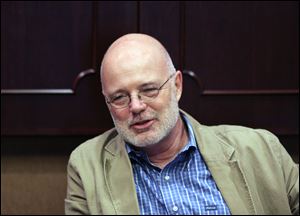
A new quest for Christianity
2/27/2010
Brian McLaren poses 10 questions to spur conversations in his latest book, ‘A New Kind of Christianity.'
Brian McLaren doesn't relish the thought that his words might offend and anger people. But the author, adviser, and ex-pastor realizes that it goes with the territory when one is challenging the status quo.
"Some people are temperamentally wired to be fighters. That's certainly not me. But I guess I'm curious enough that I kept asking questions," Mr. McLaren, 53, said in an interview with The Blade.
In his latest book, A New Kind of Christianity: Ten Questions that Are Transforming the Faith (HarperOne), Mr. McLaren writes that the time has come for a sequel to the 95 theses that Martin Luther nailed to the door of the Castle Church in Wittenberg Germany, on Oct. 31, 1517.
"Those 95 theses successfully sparked debate that further destabilized the uneasy status quo of the late Middle Ages, thus helping tip the Christian community from its medieval state into a new modern state," he writes.
Luther's challenges have achieved their purpose and "it's time for another tipping point; it's time, we might say, for a 96th thesis," Mr. McLaren said.
Rather than making declarations to spark debate, as Luther did, he is proposing a new "quest" that is fueled by questions and conversations.
The 10 questions he poses in A New Kind of Christianity address foundational aspects of the faith, including: "How should the Bible be understood?," "Who is Jesus and why is he important?," "What is the Gospel?," and "Can we find a way to address human sexuality without fighting about it?"
In the interview, Mr. McLaren acknowledged that he is calling for changes knowing that many people are resistant to change.
"There's an irony, almost a pun, to 'if it ain't broke, don't fix it.' If there's still a little money in the bank account, we don't see any need to change," he said.
Yet faith groups that lack vision and that fail to adapt to changing times may find themselves on the brink of extinction.
"Every faith community has to balance its memory and its imagination," Mr. McLaren said. "It has to maintain its memory, but if it loses imagination then it stagnates. And I think younger generations don't just want to be brought into a 'community of memory.'•"
Meanwhile, he said, the divisive debates within faith communities over human sexuality - particularly ordination of gays and blessings of same-sex unions - are surface symptoms of the deeper questions.
"Issues of human sexuality are the tip of the iceberg, and the hidden part of the iceberg is our whole understanding of what human beings are," he said.
Most Americans hold a "ghost in the machine" view of humanity derived from the philosophy of Rene Descartes: that the soul is a ghost inhabiting a body, which is a machine.
"We struggle about sexuality because we're having a deeper argument about whether the ghost in the machine model fits anymore," Mr. McLaren said. "When we start to take seriously how the human being is a unit and that the soul and body can't be so easily disentangled, suddenly issues of sexual identity become a lot more complicated."
Mr. McLaren said change was necessary at the birth of Christianity, then again in its childhood and adolescence. Now, as it stands on the verge of early adulthood, "wherever that sense of quest has been buried … the Christian faith in all its forms is in trouble."